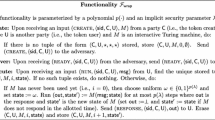Abstract
Oblivious transfer (OT) is a powerful primitive in modern cryptography, often used in a context of semi-honest adversaries. Committed oblivious transfer (COT) is an enhancement involving the use of commitments, which can be used in many applications of OT covering particular malicious adversarial behavior. For OT, many protocols are known that cover the transfer of bit strings rather than just single bits. For COT, though, the known protocols only cover the transfer of bits.
In this paper, we thus present efficient COT protocols for transferring (long) bit strings, which perform quite well in comparison to the most efficient COT protocols for bits. We prove the security of our protocols following the simulation paradigm in the cryptographic model, also assuming the random oracle model for efficient non-interactive proofs. Also, as a motivation for the use of COT instead of OT, we point out that a protocol which uses OT as a subprotocol may have subtle security issues in the presence of malicious adversaries.
Access this chapter
Tax calculation will be finalised at checkout
Purchases are for personal use only
Preview
Unable to display preview. Download preview PDF.
Similar content being viewed by others
References
Canetti, R.: Universally composable security: A new paradigm for cryptographic protocols. In: IEEE Symposium on Foundations of Computer Science, pp. 136–145. IEEE Computer Society Press, Los Alamitos (2000)
Cachin, C., Camenisch, J.: Optimistic fair secure computation. In: Bellare, M. (ed.) CRYPTO 2000. LNCS, vol. 1880, pp. 93–111. Springer, Heidelberg (2000)
Cramer, R., Damgård, I.: Linear zero-knowledge – a note on efficient zero-knowledge proofs and arguments. In: ACM Symposium on Theory of Computing – STOC 1997, pp. 436–445. ACM Press, New York (1997)
Cramer, R., Damgård, I., Nielsen, J.: Multiparty computation from threshold homomorphic encryption. In: Pfitzmann, B. (ed.) EUROCRYPT 2001. LNCS, vol. 2045, pp. 280–300. Springer, Heidelberg (2001)
Cramer, R., Damgård, I., Schoenmakers, B.: Proofs of partial knowledge and simplified design of witness hiding protocols. In: Desmedt, Y.G. (ed.) CRYPTO 1994. LNCS, vol. 839, pp. 174–187. Springer, Heidelberg (1994)
Camenisch, J., Neven, G., shelat, a.: Simulatable adaptive oblivious transfer. In: Camenisch, J., Neven, G. (eds.) EUROCRYPT 2007. LNCS, vol. 4515, pp. 573–590. Springer, Heidelberg (2007)
Crépeau, C.: Equivalence between two flavours of oblivious transfers. In: Pomerance, C. (ed.) CRYPTO 1987. LNCS, vol. 293, pp. 350–354. Springer, Heidelberg (1988)
Crépeau, C.: Verifiable disclosure of secrets and applications. In: Quisquater, J.-J., Vandewalle, J. (eds.) EUROCRYPT 1989. LNCS, vol. 434, pp. 181–191. Springer, Heidelberg (1990)
Crépeau, C., van de Graaf, J., Tapp, A.: Committed oblivious transfer and private multi-party computation. In: Coppersmith, D. (ed.) CRYPTO 1995. LNCS, vol. 963, pp. 110–123. Springer, Heidelberg (1995)
Damgård, I., Jurik, M.: A generalization, a simplification and some applications of Paillier’s probabilistic public-key system. In: Kim, K.-c. (ed.) PKC 2001. LNCS, vol. 1992, pp. 119–136. Springer, Heidelberg (2001)
Damgård, I., Jurik, M.: A length-flexible threshold cryptosystem with applications. In: Safavi-Naini, R., Seberry, J. (eds.) ACISP 2003. LNCS, vol. 2727, pp. 350–364. Springer, Heidelberg (2003)
Damgård, I., Nielsen, J.: Universally composable efficient multiparty computation from threshold homomorphic encryption. In: Boneh, D. (ed.) CRYPTO 2003. LNCS, vol. 2729, pp. 247–264. Springer, Heidelberg (2003)
Even, S., Goldreich, O., Lempel, A.: Randomized protocol for signing contracts. Communications of the ACM 28, 637–647 (1985)
Garay, J., MacKenzie, P., Yang, K.: Efficient and universally composable committed oblivious transfer and applications. In: Naor, M. (ed.) TCC 2004. LNCS, vol. 2951, pp. 297–316. Springer, Heidelberg (2004)
Jarecki, S., Shmatikov, V.: Efficient two-party secure computation on committed inputs. In: EUROCRYPT 2007. LNCS, vol. 4515, pp. 97–114. Springer, Heidelberg (2007)
Kiraz, M., Schoenmakers, B.: A protocol issue for the malicious case of Yao’s garbled circuit construction. In: 27th Symposium on Information Theory in the Benelux, pp. 283–290 (2006)
Lipmaa, H.: Verifiable homomorphic oblivious transfer and private equality test. In: Laih, C.-S. (ed.) ASIACRYPT 2003. LNCS, vol. 2894, pp. 416–433. Springer, Heidelberg (2003)
Mohassel, P., Franklin, M.: Efficiency tradeoffs for malicious two-party computation. In: Yung, M., Dodis, Y., Kiayias, A., Malkin, T.G. (eds.) PKC 2006. LNCS, vol. 3958, pp. 458–473. Springer, Heidelberg (2006)
Malkhi, D., Nisan, N., Pinkas, B., Sella, Y.: Fairplay – a secure two-party computation system. In: USENIX Security, pp. 287–302 (2004)
Naor, M., Pinkas, B.: Efficient oblivious transfer protocols. In: SODA 2001. 12th annual ACM-SIAM symposium on Discrete algorithms, pp. 448–457. ACM Press, New York (2001)
Pinkas, B.: Fair secure two-party computation. In: Biham, E. (ed.) Advances in Cryptology – EUROCRYPT 2003. LNCS, vol. 2656, pp. 87–105. Springer, Heidelberg (2003)
Rabin, M.: How to exchange secrets by oblivious transfer. Technical Report TR-81, Harvard Aiken Computation Laboratory (1981)
Schoenmakers, B., Tuyls, P.: Practical two-party computation based on the conditional gate. In: Lee, P.J. (ed.) ASIACRYPT 2004. LNCS, vol. 3329, pp. 119–136. Springer, Heidelberg (2004)
Tzeng, W.: Efficient 1-out-of-n oblivious transfer schemes. In: Naccache, D., Paillier, P. (eds.) PKC 2002. LNCS, vol. 2274, pp. 159–171. Springer, Heidelberg (2002)
Author information
Authors and Affiliations
Editor information
Rights and permissions
Copyright information
© 2007 Springer-Verlag Berlin Heidelberg
About this paper
Cite this paper
Kiraz, M.S., Schoenmakers, B., Villegas, J. (2007). Efficient Committed Oblivious Transfer of Bit Strings. In: Garay, J.A., Lenstra, A.K., Mambo, M., Peralta, R. (eds) Information Security. ISC 2007. Lecture Notes in Computer Science, vol 4779. Springer, Berlin, Heidelberg. https://doi.org/10.1007/978-3-540-75496-1_9
Download citation
DOI: https://doi.org/10.1007/978-3-540-75496-1_9
Publisher Name: Springer, Berlin, Heidelberg
Print ISBN: 978-3-540-75495-4
Online ISBN: 978-3-540-75496-1
eBook Packages: Computer ScienceComputer Science (R0)





